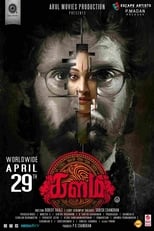timesofindia
May 15, 2016
As for as debut efforts go, Kalam is a well-made piece of work. The filmmaking is assured, the performances decent and the plot has surprises to keep us engaged. There are times when we can see the director, Robert Raaj, ticking off one must-have after another in this genre (hooded figures, possessed kids, suspicious-looking maid, creepy props, et al), and thankfully, they mostly do not come across as cliched. And it also helps that they are tense and scary, thanks to Mukesh G's camera angles and the background score by Josh Franklin and Subish Chandran (who has also written the dialogues).
That said, the film also feels like a show reel more than anything else for its director. He seems to have taken a leaf out of Karthik Subbaraj and gone for something that is a safe bet (horror, which is a trend these days) and more importantly, economical (the film has only a handful of characters and is mostly set inside a bungalow).
The plot involves a couple, Gautham and Deeksha, moving into an opulent house that has been gifted to them by the former's father, Madhan. Madhan is an extortionist and has managed to make this building, which belonged to a zamindar and whose heirs are no longer alive, his own. Very soon, eerie things begin to happen and Deeksha learns from Neela, an artist who visits the place, that the building has a gruesome history and it could possibly be haunted. Enter Srinivasan, a psychic who tries to help them. Can he save them before it is too late? Are the ghosts for real?
As in Pizza, a large portion of Kalam happens in a single building and with a handful of characters. Almost half of the film's running time involves characters (mostly alone, and at times, with company) walking from one room of the building to the next after sensing a mysterious presence. There is even a twist in the climax that makes us review whatever we have seen until then. But the characters are not strongly written to make us care for them. Gautham and Deeksha come across as a rather bland couple and they are given minimal things to do; he has to go to office and she has to act paranoid. There are also times when Robert Raaj stretches scenes beyond necessary (the episode involving Madhan, for example). And this is why the film never gets under our skin. Horror movies have also become commonplace these days that they need something special to truly thrill us. In that sense, you could call Kalam a thin-crust Pizza — has everything you expect, but somehow doesn't seem fullfilling.
